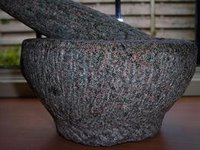A Roman dinner

Italian cuisine has changed over the years. In the old days (we're talking first centuries of this era) pasta didn't exist, and instead of salt the Romans used garum, a liquid of fermented fish, to spice up their dishes. Garlic was eaten by peasants and poor people only, because of the odour. Slaves got just enough leftovers and garbage to stay alive.
All this wisdom I learned from J who is setting up a course in Roman cooking and invited some friends as a tryout. Recipes were deducted and translated by J from Apicius' De Re Coquinaria, some poems by Martial and one by pseudo-Virgil.
Academics might think it a pity that all we know about Roman society is restricted to the life of the happy few. For our dinner it was no loss. As appetizers we had moretum, epiturium and salted fish accompanied by a tasty mulsum. The main dishes consisted of cooked fish with a sweet and sour sauce and roasted doves. Pudding came as apothermum and patina (a platter of peaches cooked with cumin, parsley-seed, pepper and garum - and yes, it's delicious), although the latter is in fact a starter.
As I was chosen to try my hand at the moretum, I'll elaborate on that one.
You need a mortar (the name moretum is no coincidence), a lump of parmesan cheese (ca 200 gr), one or two cloves of garlic, fresh celery-leaves, fresh coriander, olive oil and a drop of balsamic vinegar. Put roughly two handsfull of the leaves (and stems) in the mortar with the garlic and crush them till they are an unidentifiable green mass. Add grated parmesan, oil, vinegar and if you like a bit of sea salt. Continue crushing until you understand why the Romans had slaves for this kind of work. By then the moretum should be a vivid green paste. Tastes great on unleavened bread.


0 Comments:
Post a Comment
<< Home